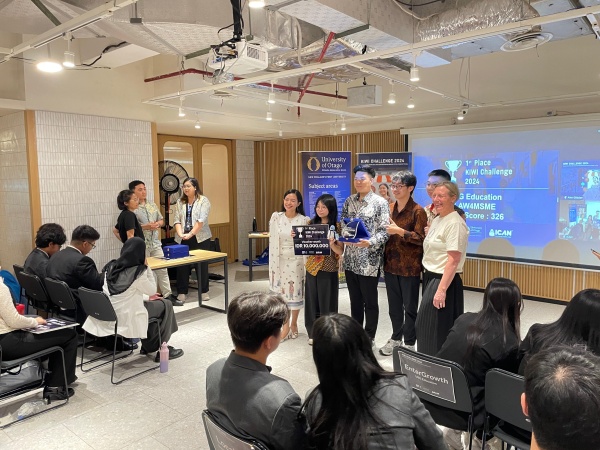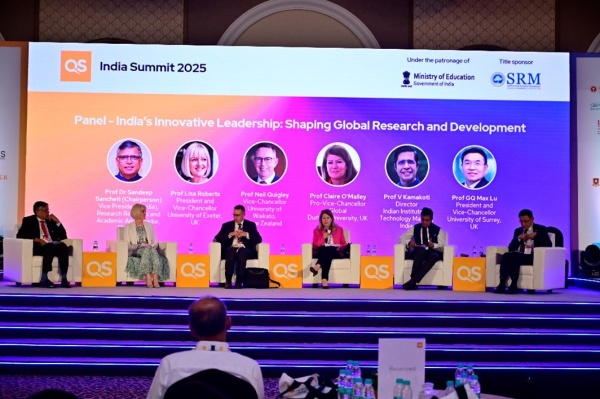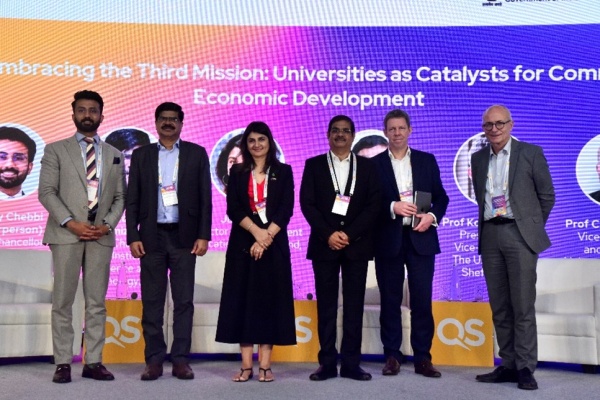Search
Showing 10 of 1867 results for how to register international groups
- International photo roundup
- International photo roundup
-
Update from Immigration NZ
Improving how Immigration New Zealand processes Student Visa applications
You may be aware that Immigration New Zealand (INZ) will move student visa applications onto its enhanced Immigration Online platform in the second half of 2025.
As part of this work, INZ is designing ways to improve the experience of applicants by:
- making it clearer which type of student visa to apply for
- improving information on the evidence requirements (especially financial evidence and demonstrating genuine, or bona fide intentions) and
- improving visibility of the progress of applications.
After initial designs are developed, INZ will test these with a group of students and nominees from education provider peak bodies that include:
- Universities New Zealand
- Te Pūkenga
- Schools International Education Business Association (SIEBA)
- Independent Schools NZ (ISNZ)
- Independent Tertiary Education New Zealand (ITENZ)
- Quality Tertiary Institutions (QTI)
- English New Zealand (Private and University English Language Colleges)
This work is centred around ways customers apply for student visas, and how INZ processes these. Substantive policy change is not part of this work.
INZ's focus is on implementing key improvements for students and the sector and ensuring a successful transition to its enhanced Immigration Online platform.
-
New undergraduate scholarship programme for Vietnamese students
The Awards are designed for Vietnamese students pursuing undergraduate studies in New Zealand.
With the announcement of the new scholarship scheme, New Zealand now provides a full suite of support for Vietnamese students at all study levels with its government-supported scholarship programmes. In addition to the new programme, the New Zealand Schools Scholarships are specifically on offer for Vietnamese students in grades 8, 9, and 10 to study at New Zealand high schools, as well as Manaaki Scholarships for Vietnamese candidates pursuing postgraduate study programmes in New Zealand.

Caroline Beresford (3rd from right), NZ Ambassador to Vietnam, supported the launch by hosting a media briefing to promote the new scholarship programme on 15 November
Commenting on the initiative, Ben Burrowes, Acting General Manager – International at ENZ said, “New Zealand’s tertiary education system is highly regarded globally for its positive impacts on students and communities. The inclusion of all New Zealand universities in the new programme underscores our strong commitment to expanding learning and development opportunities for Vietnamese students at our world leading institutions. The initiative also demonstrates New Zealand’s dedication to fostering our bilateral educational ties as we approach the 50th anniversary of our longstanding partnership with Vietnam next year.”
The 2025 programme offers 14 scholarships, worth NZD 15,000 each, for students enrolling at one of New Zealand's eight universities: University of Auckland, Auckland University of Technology, University of Waikato, Massey University, Victoria University of Wellington, University of Canterbury, Lincoln University, and University of Otago ed. Applications are expected to open in May 2025 for the February 2026 intake.
-
ENZ showcases New Zealand’s commitment to sustainability in education and UN SDGs in India
Education New Zealand Manapou ki te Ao (ENZ) hosted a vibrant Sustainability Carnival on 14 November at the New Zealand High Commission in New Delhi to round off ENZ’s #SustainableTomorrow campaign that was designed to highlight New Zealand’s commitment to SDGs and sustainability in education.
The event showcased New Zealand university course offerings and officially launched ENZ’s Sustainability Guide, a comprehensive resource profiling course offerings in sustainability at New Zealand universities and the New Zealand Institute of Skills and Technology (NZIST).
The event saw over 150 attendees, including representatives from five New Zealand universities, three Indian universities, and students, parents, and teachers from New Delhi’s international schools. The Sustainable Tomorrow campaign was launched as a comprehensive digital and social campaign to spotlight sustainability within the educational landscape. Through diverse activities, and partnerships, the campaign highlighted New Zealand's commitment to embedding sustainable practices in education. It reached 82,266 accounts via the New Zealand in India Instagram page, engaged 2,935 accounts and saw 165 profile visitors.
As part of the campaign, ENZ launched a digital poster design competition for Indian high school students. Centred around the Innovating for a Sustainable Future theme, the competition aimed to raise awareness of key United Nations Sustainable Development Goals (SDGs), including Goal 7 (Affordable and clean energy), Goal 9 (Industry, innovation, and infrastructure), Goal 12 (Responsible consumption and production), and Goal 13 (Climate action). The winning posters were unveiled and recognised at the Sustainability Carnival, which also featured a series of other exciting activities, including street plays performed by students on the importance of sustainability, as well as a croquet match with the New Zealand High Commissioner to India Patrick Rata.
ENZ’s Director of Engagement, India and East Asia, Jugnu Roy, said the campaign did well to spotlight New Zealand’s strong credentials in sustainability stewardship to secondary school students, teachers and parents in India.
“The campaign was a fantastic opportunity to highlight New Zealand universities’ sustainability leadership, particularly their top global ranking for sustainability stewardship in the Times Higher Education Impact Rankings 2024.
“The launch of the ENZ Sustainability Guide that promoted course offerings related to UN SDGs at New Zealand universities and Te Pūkenga really drove home the message about New Zealand’s commitment to a sustainable future that’s visible through our wide range of sustainability-focused education offerings,” Jugnu said.

New Zealand High Commissioner to India, Patrick Rata interacts with New Zealand university and Te Pūkenga representatives at the Study with New Zealand booth at the Sustainability Carnival.

Secondary school and higher education institution students and teachers from India with New Zealand High Commissioner to India, Patrick Rata at the Sustainability Carnival in New Delhi.
-
Winners of KIWI Challenge announced
This year was the first where university students were able to enter a new category alongside the schools' challenge.
The winning teams from Petra Christian University and USG Education headed off strong competition from eight other finalists, drawing praise from the judges for their solutions to support youth-led Small and Medium Enterprises (SMEs).
Finalists presented to a panel of judges from University of Otago – Ōtākou Whakaihu Waka and Education New Zealand Manapou ki te Ao (ENZ), who were cohosting the initiative.
Both winning teams received a voucher valued at 10,000,000 Indonesian Rupiah (approximately 1,000NZD) as well as virtual internships from the University of Otago – Ōtākou Whakaihu Waka commencing in semester one, 2025.
Tech-led solutions
A team from Petra Christian University developed an app ‘Partify’ which connects emerging small businesses and keen part-time workers. Businesses post part-time jobs, and workers swipe to find flexible gigs nearby, with AI matching candidates based on skills, location, and availability.

Partify university winner – ENZ market manager Naluri Bella and University of Otago Regional Market Manager Sarah Ewing present the award for First Place in the University category to team members from Petra Christian University for their app ‘Partify’.
In the high school category, a team from USG Education took the top prize with ‘LAW4MSME’, a platform allowing small businesses to access legal information and advice.

LAW4MSME High school winner - ENZ market manager Naluri Bella and University of Otago Regional Market Manager Sarah Ewing present the award for First Place in the University category to team members from USG Education for their platform “LAW4MSME’.
Explaining the group’s business idea, team leader for LAW4MSME, David Francis said the students found that Indonesian youth-led SMEs lack knowledge of the laws and regulations needed to run their businesses.
“To address this, we developed an AI bot that educates SME owners on these regulations, helping them navigate legal requirements more effectively,” David said.
The KIWI Challenge competition aims to inspire youth across Indonesia to engage in entrepreneurial activities and help resolve societal issues. Over the five years the competition has run, 1000 Indonesian youth have participated. This year, Education New Zealand Manapou ki te Ao (ENZ) partnered with University of Otago to co-host the initiative.
This year’s competition included 49 teams with a total of 221 student participants.
Mentorship key
Mentorship is a key element of the competition. The finalists attended a workshop run by Associate Professor Dr Conor O’Kane, Head of the Bachelor of Entrepreneurship programme at Otago Business School. This assisted entrants to develop their ideas and refine business plans.
ENZ Acting General Manager International Ben Burrowes said he’s delighted to see the continued development of the KIWI Challenge.
“Inviting university students for the first time has given us the opportunity to include a whole new cohort of talented young entrepreneurs, and we have been very impressed with the quality and creativity of their submissions,” Ben said.
“The competition has also benefitted from the enthusiasm and expertise of our colleagues at the University of Otago, and we are grateful for their willingness to partner with us for the KIWI challenge’s fifth year.”
Dr O’Kane said it was inspiring to witness the quality of entrepreneurial thinking among Indonesian students.
“These students have very bright futures. The concepts and programmes the finalists presented were remarkable and captured the impressive ability of the teams to identify tangible business problems and visualise and communicate a solution to these challenges,” Dr O’Kane said.
- International photo round up
-
Empowering early career scientists through New Zealand-Germany research collaboration
The third funding round of the New Zealand-German academic exchange programme, known as the Programmes for Project-Related Personal Exchange (PPP programme), has enabled five New Zealand research projects to undertake research with academic partners from Germany.
The following universities have formed partnerships:
- University of Auckland and University of Paderborn
Topic: Preparing students for a data science future using innovative teaching - University of Auckland and the Technical University of Dortmund
Topic: The development of contextual visual processing in the Ebbinghaus: illusion in children and its underlying neuronal basis (EBBI-KIDS) - University of Auckland and University Medical Centre Hamburg-Eppendorf
Topic: Perspectives of equitable medical education: a comparison between Aotearoa New Zealand and Germany - University of Canterbury and Westcoast University of Applied Sciences
Topic: Younger generations as reflexive agents of change: Motivating Generation (Gen) Z to participate in the voluntary sector - University of Otago and Helmholtz Munich
Topic: Modulation of central GIPR signalling to increase health during ageing
The programme invited researchers to think of a project that would particularly benefit from working with German academic counterparts. Research projects will run from 2025 to 2026, with work taking place in both New Zealand and Germany.
Acting Regional Director, Americas & Europe, Natalie Lulia, said the programme aims to strengthen the relationships between New Zealand and German academics and institutions.
“It opens up New Zealand researchers to a global network of academics.
“Since the programme’s beginning, we’ve seen awardees think forward and explore possibilities of further collaboration with their research partners” she said.
The PPP programme was established in 2021, when ENZ and the German Academic Exchange Service (DAAD) signed a Memorandum of Understanding.
The bilateral agreement between ENZ and the DAAD enables young academics to further their careers and expand their international research links. ENZ contributes funding to support New Zealand researchers, while the DAAD supports German researchers to travel to New Zealand.
Find out more about the PPP programme by visiting the dedicated page on our website.
You can also contact Olga Elli, Associate Director of Engagement, Europe at europe@enz.govt.nz.
- University of Auckland and University of Paderborn
-
New Zealand universities showcased to global education leaders at QS India Summit 2025
The initiative was well aligned with ENZ’s goal to build global connections for New Zealand education and explore solid opportunities that will help New Zealand thrive through world-class international education.
Education New Zealand Manapou ki te Ao (ENZ), along with the University of Canterbury, University of Waikato and Massey University made an impactful presence across a range of sessions and workshops.
The summit had the New Zealand contingent showcase the quality of our universities and engage in discussions focused on university-industry collaborations, workforce development, global research leadership, while discussing the importance of building resilient, education institutions that can adapt to a rapidly changing world.

Prof. Neil Quigley, Vice-Chancellor of the University of Waikato, exploring India’s leadership in cost-efficient R&D and its role in supporting global partnerships to address pressing challenges at the QS India Summit 2025.
ENZ’s Director of Engagement, East Asia & India, Jugnu Roy, led a discussion on aligning curricula with emerging job market demands to better prepare students for global careers.

ENZ’s Jugnu Roy discussed how universities could drive social and economic impact beyond their primary roles of teaching and research at the QS India Summit 2025.
Considering how well recognised New Zealand universities are globally, with all eight ranked in the top 2 percent in the 2025 QS World University Rankings, the QS Summit was an opportunity for New Zealand education to strengthen its relationships with key global and Indian education leaders, Jugnu said.
“New Zealand universities are also known for their sustainability stewardship, with our universities ranking first for sustainability stewardship and second for sustainability outreach in the Times Higher Education Impact Rankings 2024.
“Within this context, the summit was a strong platform for us to share best practices and explore new avenues for collaboration between New Zealand and India.
“We look forward to collaborating with global and Indian leaders in education to shape a brighter future together.”
- International students welcomed across New Zealand

